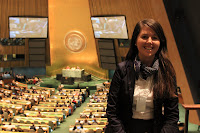Reflections on the 56th session of the Commission on the Status of Women
By Marta Ponikowska

Political participation and lack of women in the decision-making process in politics and economy are two main factors that influence the situation of women, according to Mrs. Bachelet, Under-Secretary-General and Executive Director, UN Women. Over the course of the 56th session of the Commission on the Status of Women in New York, I have heard this statement repeated many times, both during the conference and the side events. Mrs. Bachelet’s opinion was especially emphasized during the panel on the role of parliaments. One delegate echoed her position saying that only through education and training can women be active in politics.
I agree that education plays a crucial role and women should have an equal access to education, health care, rights to own property or start a business. The side events I attended during the CSW (like Gender Budgeting organised by Austria or Equal Payday organised by Business and Professional Women International) demonstrated clear signs that women play active roles in public policy and civil society. Nevertheless, I would like governments, international organisations, and civil society organisations to look at the status of women, not only from the human rights point of view, but from the natural law point of view as well.
The UN Women Annual Report 2010-2011 that was available at the conference quotes the words of a woman from the Occupied Palestinian Territory, “I dream of a world where women are in decision-making positions. I dream that my daughter will be a leader and decision maker.” Well, I dream of a world where public policy makers and legislators recognize that for some women, motherhood and family vocation is a priority, a world where the status of women is also discussed in the context of their vocation for the family. I would like to follow the Palestinian woman’s quote with one from Helen Alvaré, professor of law and mother of three. “(…)It seems, rather, that the questions that families, employers and societies will be grappling with in the future will be far more nuanced. They will be questions about how simultaneously to honor our priority for children, women’s vocational goals and business goals.” (Motherhood- Choices About Child Rearing & Careers by Helen Alvare).
When scrutinizing the role or status of women, we should look at the bigger picture, namely at the family. The family is the basic cell of society. Ignoring the existence of some women who are devoted primarily to the family rather than to a career would be simply a misunderstanding the uniqueness of the women’s nature. I am truly glad that other the Polish delegate of the WYA for the 56th CSW at the UN, raised the importance of the involvement of men while discussing women’s status.
I left the conference with a feeling that Commission on the Status of Women is a great opportunity to gather women from around the world, but it should not be taken as an opportunity to create artificial policy statements that are far from reality or pushing women’s issue agenda in a direction that will do more harm than good.







